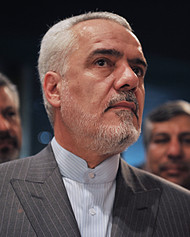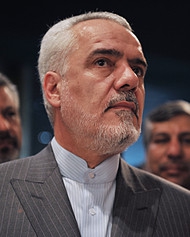Iran�said it is ready to receive foreign aid to assist survivors of two earthquakes in the country�s northwest after earlier declining offers of help.

�Our country has, on various occasions, provided help to victims of accidents in other countries,� Iranian Vice President Mohammad Reza Rahimi said, according to the state-run�Mehr�news agency. �In the current context we are ready to receive foreign assistance.�
Two earthquakes that struck the northwestern province of East Azerbaijan on Aug. 11 destroyed dozens of villages, killing at least 306 people and leaving thousands homeless, Iranian officials have said. The northwest is home to Azeris, who speak a Turkic language and are the country�s largest ethnic minority.
In the aftermath of the quakes, Interior Minister Mostafa Mohammad-Najjar said that Iran had declined offers from abroad and would be relying on its �domestic potential� for the relief work. The U.S.,�Russia�and�Switzerland�are among the nations that have expressed their readiness to provide humanitarian aid.
The Iranian government has provided emergency accommodation to 16,000 people and set up 5,600 tents, Mahmoud Mozafar, head of relief and rescue at Iran�s Red Crescent Society, was cited as saying in a�state television�report yesterday.
Aftershocks
Images on Iranian state television showed people in the region sleeping outside in streets and parks, without tents or supplies. More than 55 aftershocks were recorded in the province in the past two days alone, according to the Tehran-based�Iranian Seismological Center.
Out of the 4,500 people who were injured, about 1,200 were transferred to hospitals mostly in Tabriz and the rest treated in ambulances and makeshift treatment centers, Gholamreza Masoumi, a Health Ministry official and head of the�emergency services, said yesterday according to the state-run�Fars�news agency.
Masoumi said he was concerned about a shortage of makeshift toilets and bottled drinking water that could lead to a spread of disease. The corpses of farm animals, some of which were found lying near water sources, could also contribute to an outbreak, he said.
Iran sits on several�fault lines�and is frequently hit by earthquakes. An estimated 40,000 people were killed in 2003 when a temblor flattened the city of Bam in the southern province of Kerman.
The�U.S. Geological Survey�said the quakes hit within 11 minutes of each other in the late afternoon. The first had a magnitude of 6.4 with an epicenter 12 miles (20 kilometers) west-southwest of�Ahar. It was followed by a 6.3-magnitude temblor 19 miles west-southwest of the area. Both occurred at a depth of less than 6.2 miles, the USGS said in advisories on its website.
The Iran Project is not responsible for the content of quoted articles.











